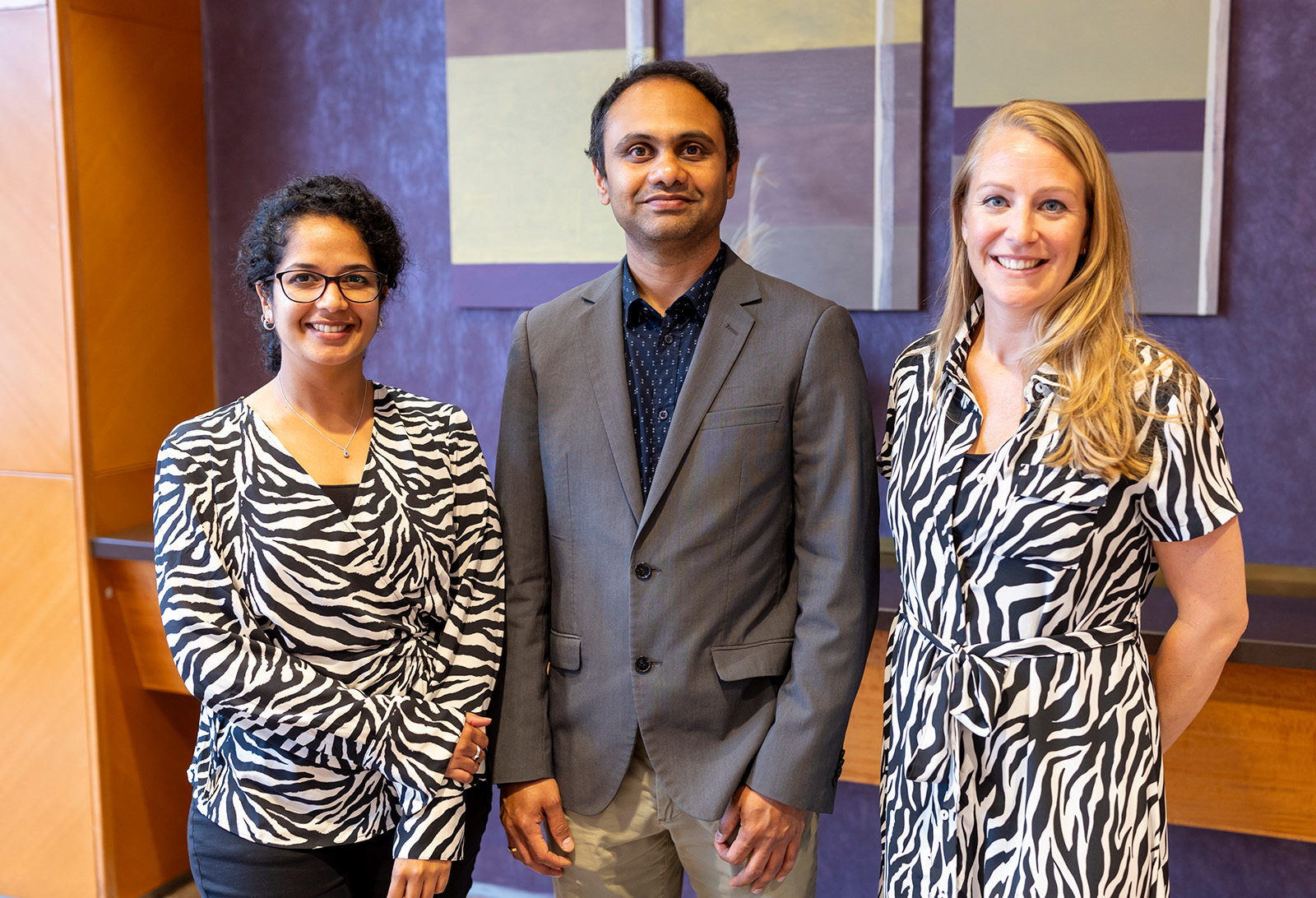Grant management: The solid foundation that supports ECRAID-Base
A long, expensive international collaboration like ECRAID-Base needs firm steering and diligent coordination. Grant Manager Rachel Vijlbrief is part of the team that makes sure the wheels turn smoothly. We spoke with her about the team’s responsibilities and challenges, as well as her hopes for the future of European clinical research.
The EU-funded ECRAID-Base project is as ambitious as it is complex. A budget of over 30 million euro is shared between 19 partner organisations based in nine countries, collaborating in various configurations in 13 different work packages over a period of five years. What could possibly go wrong?
A project of this scale would be impossible without the guidance of an experienced grant management team which undertakes all the grant and project management and network coordination activities. In ECRAID-Base, this important role is shared by Ram Venkatachalam (pictured in the centre), Rachel Vijlbrief (right), and Arya Lekshmi Nair (left).
We caught up with Rachel to get a better idea of her team’s responsibilities and challenges, as well as her hopes for the future of European clinical research.

What are your core responsibilities in projects like ECRAID-Base? What expertise do you contribute?
In the pre-grant phase we help draft a budget proposal and content for the grant application. We then support the drawing up of grant agreement and consortium agreement and all work related to this.
Once a project has commenced, we are responsible for its overall management, monitoring progress, drafting and implementing changes to the agreements, as well as handling the financial, administrative, and legal issues surrounding the project.
We are also the central point of contact for the partners in these consortia and the funding agencies (e.g., the European Commission). We act as a sparring partner and advisor to the project coordinator and the consortium members, and we guide and facilitate meetings.
In close consultation with the project officer and coordinator, we oversee the work of all project partners and we contribute to the timely achievement of their deliverables and milestones.
What has your team achieved during the first three years of the project?
We are very happy with the project’s progress so far. Despite some considerable challenges, such as delays in getting some of the perpetual observational studies off the ground, the consortium has been meeting its obligations consistently. This is, of course, a collective achievement, but the grant management team has been instrumental in moving the project forward. Both the first and the second periodical reports we submitted were received positively by the Commission and the independent reviewers, which gives us confidence that we are succeeding at what we set out to do.
What are some of the lessons you’ve learned from working on ECRAID-Base?
Despite the substantial size of the grant we received, having so many objectives and partners makes it very important to monitor and control expenses. Otherwise things can quickly get out of hand.
Another lesson I’ve learned is that timely and well-structured internal communication, both between partners and between the consortium and the European Commission, is of utmost importance to keep the consortium aligned and on track. We can learn so much from each other if we communicate about struggles and successes.
What are some of the project management challenges you face in your WP?
ECRAID-Base is an enormous consortium comprising people of diverse background, expertise, ambitions, and way of working. This is an advantage, but it can also be a challenge. With so many people pursuing different ideas and ambitions, keeping the shared goals is challenging.
What other projects are you working on? Can you please tell the readers a bit more about a day in the life of Rachel?
I am primarily responsible for the grant management of two projects; ECRAID-Base and VITAL (Vaccines and Infectious disease in the Ageing Populations). VITAL is a IMI2 project with 19 partners which started in 2019 and will end this year. Next to this I work on pre-grants, proposals and budget. Hopefully some of these will turn into new projects which will help secure Ecraid’s self-sustainability for the foreseeable future.
Looking forward: What are some of your hopes for the future of clinical research in Europe?
I would like to advocate for more budget for post-management activities, such as data sharing, networking and sustainability of project data and scientific knowledge. This way closed projects can serve as stepping stones for the new projects and networks, preventing the all too familiar scenario where work has to start from scratch. The Ecraid Foundation is leading the way and is itself a best practice example for how to maintain networks and use the existing knowledge in new proposals and clinical studies.
![]() Th ECRAID-Base project has received funding from the European Union’s Horizon 2020 research and innovation programme under Grant Agreement No. 965313.
Th ECRAID-Base project has received funding from the European Union’s Horizon 2020 research and innovation programme under Grant Agreement No. 965313.